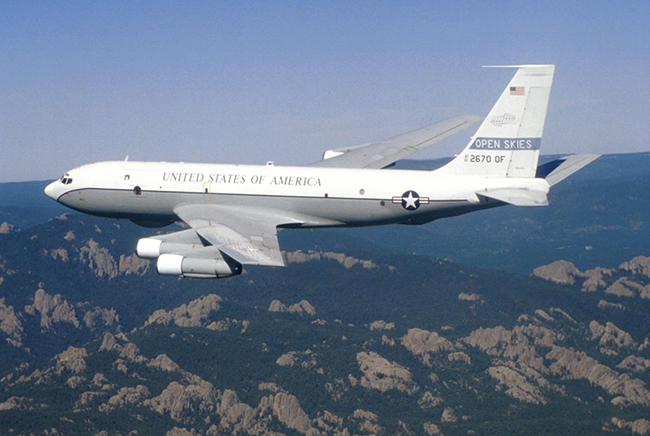An OC-135B Open Skies aircraft takes flight on Aug. 13, 2015, at Offutt AFB, Neb. The Open Skies is an observation aircraft used for treaty support enhancing global peace, stability, and cooperative security. Air Force photo by Josh Plueger.
The Trump administration is reportedly considering pulling out of the Open Skies Treaty, a move that has raised some alarm in Washington, D.C., despite years of concern that Russia is disobeying the pact.
House Foreign Relations Committee Chairman Rep. Eliot Engel (D-N.Y.) raised the possibility of leaving the treaty, calling it a “reckless action” in an Oct. 7 letter to National Security Adviser Robert O’Brien.
“Observation flights under the treaty have generated additional information regarding Russian military action in Ukraine and provided a check on further Russian aggression there,” Engel wrote. “Withdrawal risks dividing the trans-Atlantic alliance and would further undermine America’s reliability as a stable and predictable partner when it comes to European security.”
A Pentagon spokesperson referred questions on treaty flights to the State Department. The White House did not respond to a request for comment Oct. 8.
Any decision to withdraw must go through a “thorough interagency review and consultation with Congress,” Engel said, adding that he has not heard of such talks so far.
He pointed to concerns within the federal government that Russia is not fulfilling its obligations under the treaty, which has been enforced since 2002 and allows about three dozen signatory countries to monitor each others’ domestic military activity. The US flies those missions with two nearly 60-year-old, camera-equipped Air Force OC-135Bs, which are in the early stages of a replacement effort.
US Strategic Command on Oct. 8 recirculated an earlier tweet from Rep. Don Bacon (R-Neb.) saying “OC-135B supports [the treaty] by flying peaceful, unarmed flights over 30+ participating countries to observe military forces and activities. This helps build confidence & increase transparency.” STRATCOM also referred questions to the State Department.
Recent legislation has looked to withhold funding from the new jets for reasons related to Russia’s treaty violations and how Moscow conducts observation flights. Russia has restricted observation flights over Kaliningrad and the South Ossetia and Abkhazia regions of Georgia, setting off a series of US actions intended to nudge Russia into compliance. Russia retaliated with its own decision to stop offering overnight accommodations for American flight crews, among other moves.
“The implementation of the US measures and Russia’s ‘reciprocal’ actions were not tested during the reporting period because there were no observation missions conducted during 2018,” the State Department said in an August report. The Open Skies Consultative Commission could not agree on how to split up observation mission quotas in 2018—with the exception of one over Ukraine in December 2018 that fell outside of the standard schedule—but flights have resumed for 2019.
Engel argued that concerns about how Russia is acting under the treaty “do not rise to the level of material breach an excuse that is being peddled as the potential reason for withdrawal.”
“The United States should prepare for the challenge that Russia presents—not abandon mechanisms that provide the United States with an important tool in maintaining surveillance on Russia,” he said.
The US also decided to leave the Intermediate-Range Nuclear Forces Treaty earlier this year amid similar concerns that Russia was not abiding by its restrictions.
Not all lawmakers are opposed to withdrawing from the Open Skies Treaty, however.
“The Open Skies Treaty is out of date and favors Russia, and the best way forward is to leave it,” Sen. Tom Cotton (R-Ark.) said in a September 2018 release. That month, the US waffled on whether to certify a Russian aircraft with a digital electro-optical camera for treaty flights.
“Russia continues to illegally limit our ability to overfly key military areas,” Senate Foreign Relations Committee Chairman Jim Risch (R-Idaho) added in May 2019, arguing the US needs to rethink how it handles any treaty with Russia.
